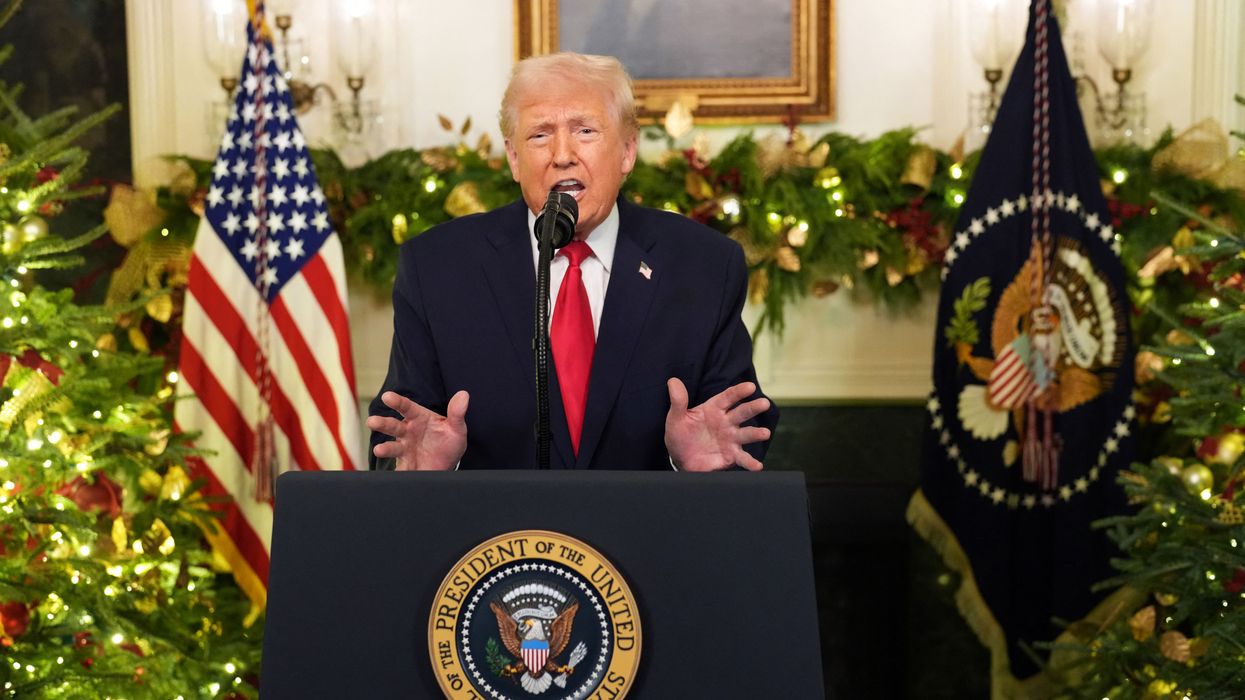September, 14 2020, 12:00am EDT

For Immediate Release
Contact:
Jimmy Wyderko: jwyderko@economicliberties.us
New York Senate Attacks the American Monopoly Crisis
Economic Liberties’ Research Director Matt Stoller Testifies on Strengthening Antitrust Law
WASHINGTON
The American Economic Liberties Project released the following statement in response to a hearing by New York State Senate's Standing Committee on Consumer Protection's about necessary updates to New York's antitrust laws.
"The Twenty-First Century Antitrust Act, sponsored by Sen. Michael Gianaris, would tighten standards around the abuse of corporate power and help address the crisis of monopoly power," said Matt Stoller, Director of Research at the American Economic Liberties Project, in testimony before the committee. "The bill would deliver a strong statement that New York rejects federal case law limiting antitrust enforcement and expects to take action against monopolies. It is a model for other states and Congress to follow."
"The last time our markets were this concentrated, officials all over the country acted. We created administrative agencies at a state, local, and Federal level, everything from securities regulators to public utility boards. Most importantly, legislatures passed new laws and enforcers enforced. We will need this level of energy and commitment once again," added Stoller.
"In addition to making crucial changes to the standard for policing corporate abuse, The Twenty-First Century Antitrust Act also authorizes class action lawsuits under New York's antitrust statute, meaning New Yorkers themselves can organize against corporate abuse. And it increases criminal penalties for abusive anti-competitive activities. Passing this bill is a critical step in attacking our monopoly crisis," said Stoller.
Over the last five years, researchers have begun identifying and measuring the impact of concentrated power. Here's what they have found:
- Corporate consolidation costs the average American household $5,000 a year in lost purchasing power (Philippon, 2019).
- Median annual compensation--now only $33,000--would be more than $10,000 higher if employers were less concentrated (Harvard Law Review, 2018).
- The more concentrated the industry, the smaller share of the profits workers receive (Journal of Finance, 2020; Quarterly Journal of Economics, 2019).
- During the 2010 to 2014 recovery, the creation of net new businesses in just five metro areas was equal to that in the rest of America combined. This concentration of new investment is likely a function of concentrations of economic power (Economic Innovation Group, 2017).
- America's start-up rate has collapsed, falling by half since the 1970s (Economic Innovation Group, 2017; Brookings Institution, 2014).
- Concentrated hospital markets--which face less competition on quality and innovation--have been associated with significantly higher mortality rates and substantially worse patient outcomes (Martin Gaynor before the House Energy and Commerce Committee, 2018; Health Affairs, 2017).
- Google and Facebook have monopolized digital advertising, harvesting nearly 60 percent of U.S. advertising revenue, decimating newspapers, magazines, and other outlets even before the coronavirus pandemic (PwC, 2019). Roughly 1,800 local newspapers have disappeared in America since 2004 (UNC, 2018).
- There are fewer startups in states where a smaller number of companies dominate (Brookings Institution, 2014).
The American Economic Liberties Project works to ensure America's system of commerce is structured to advance, rather than undermine, economic liberty, fair commerce, and a secure, inclusive democracy. Economic Liberties believes true economic liberty means entrepreneurs and businesses large and small succeed on the merits of their ideas and hard work; commerce empowers consumers, workers, farmers, and engineers instead of subjecting them to discrimination and abuse from financiers and monopolists; foreign trade arrangements support domestic security and democracy; and wealth is broadly distributed to support equitable political power.
LATEST NEWS
AOC Dismisses Premature 2028 Polls, But Says ‘I Would Stomp’ JD Vance
A survey this week showed the congresswoman leading the vice president 51-49 in a hypothetical presidential matchup.
Dec 18, 2025
Rep. Alexandria Ocasio-Cortez gave a cheeky reaction after a poll suggested that she'd slightly edge out Vice President JD Vance in a hypothetical presidential election in 2028.
The survey of over 1,500 registered voters, published Wednesday by The Argument/Verasight, showed Ocasio-Cortez (D-NY) leading Vance 51-49 and winning back several key voting demographics that propelled Trump's return to the White House last year.
As she walked out of the Capitol building Wednesday evening, the Bronx congresswoman was asked about the poll by Pablo Manríquez, the editor of Migrant Insider.
She responded to the question with a laugh: "These polls three years out, they are what they are. But, let the record show I would stomp him! I would stomp him!" she said before getting into her car.
Neither Ocasio-Cortez nor Vance has officially announced a presidential run. But Vance is considered by many to be a natural successor to President Donald Trump. The president and his allies have suggested he could run for an unconstitutional third term.
Ocasio-Cortez, meanwhile, is reportedly mulling either a presidential run or a bid to take down the increasingly unpopular Senate Minority Leader Chuck Schumer (D-NY).
More than two years out from a Democratic primary, Ocasio-Cortez is considered a likely choice to fill the progressive lane in 2028, with support for increasingly popular, affordability-focused policies, including Medicare for All.
However, despite her strong support among young voters, early polls show her behind California Gov. Gavin Newsom and former Vice President Kamala Harris for the Democratic nomination.
Wednesday's poll showed that in a hypothetical contest against Vance, Newsom had a 53% to 47% edge, a margin only slightly larger than Ocasio-Cortez's.
Keep ReadingShow Less
4 More Killed in Pacific Boat Strike as White House Ramps Up Demands for Venezuelan Oil
President Donald Trump “wants to keep on blowing boats up until Venezuelan President Nicolás Maduro cries uncle," said White House Chief of Staff Susie Wiles in a recent interview.
Dec 18, 2025
Hours after US House Republicans voted down a war powers resolution Wednesday aimed stopping the Trump administration from continuing its attacks on "presidentially designated" terrorist organizations, the death toll of the Pentagon's continued boat strikes was brought to 99 with the latest bombing in the Pacific Ocean.
US Southern Command reported Wednesday night that at the direction of Secretary of Defense Pete Hegseth, the military had killed four people in a "kinetic strike on a vessel operated by a Designated Terrorist Organization in international waters."
As with the rest of the more than two dozen bombings that the administration has carried out in the Caribbean and Pacific since September, the Pentagon said that intelligence had confirmed the boat was "engaged in narco-trafficking operations."
The White House has not released evidence that the boats it's targeted were carrying drugs. In the past, the US military has been involved in intercepting vessels suspected of drug trafficking and charging passengers with a criminal offense, but President Donald Trump has insisted the US is engaged in an armed conflict with drug cartels in the Western Hemisphere, including in Venezuela.
US and international intelligence agencies have not found Venezuela to be a significant source of drugs flowing into the US and have found the country to play virtually no role in the trafficking of fentanyl, the biggest cause of drug overdoses in the US.
The latest boat bombing came a day after Trump announced a "total and complete blockade" on oil tankers approaching and leaving Venezuela, accusing the country of stealing "Oil, Land, and other Assets" from the US.
Venezuela nationalized its petroleum sector in 1976, taking control of its own vast oil reserves. Previously, US-based companies had largely controlled the country's oil industry. In 2007, then-President Hugo Chavez further pushed out US oil giants such as Exxon Mobil when he nationalized foreign oil projects in Venezuela.
Stephen Miller, a top adviser to Trump, accused Venezuela's government of "theft" on Wednesday.
“American sweat, ingenuity, and toil created the oil industry in Venezuela,” Miller said in a social media post. “Its tyrannical expropriation was the largest recorded theft of American wealth and property. These pillaged assets were then used to fund terrorism and flood our streets with killers, mercenaries, and drugs.”
Regarding the blockade, Trump also said Wednesday that Venezuela "illegally took" US energy rights.
While the administration has insisted for months that its deadly boat strikes are aimed at stopping drug trafficking, comments from White House Chief of Staff Susie Wiles in an extensive Vanity Fair interview released Tuesday further confirmed that the White House aims to take control of the South American country.
Trump “wants to keep on blowing boats up until Venezuelan President Nicolás Maduro cries uncle," said Wiles.
Brian Finucane, senior adviser at the International Crisis Group, said Wednesday night's boat strike amounted to "more premeditated killing outside of armed conflict."
"There's a word for that," he said.
Legal experts have said the repeated, lethal bombings of boats have been part of a campaign of extrajudicial killings and have warned Hegseth and others involved in the attacks could be liable for murder.
Keep ReadingShow Less
'This Is Pathetic': Flailing Trump Defends Economic Agenda as Approval Tanks and Costs Rise
"No matter how he tries to spin it, everything is getting more expensive and the American people are hurting."
Dec 18, 2025
US President Donald Trump tried desperately to defend his stewardship of the nation's economy in a primetime address Wednesday night as prices continued to rise, unemployment jumped to a level not seen since the Covid-19 pandemic, and job growth slowed to a halt.
Consistent with his administration's recent efforts to downplay negative economic data and opinion polling, Trump falsely declared in his televised address that he is bringing "high prices down and bringing them down very fast," blaming his predecessor for economic pain that voters—including a growing share of the president's—have increasingly pinned on the current occupant of the Oval Office.
Trump had fact-checkers working furiously to keep up as he repeated lie after lie, claiming grocery prices—which are up this year—are "falling rapidly," a narrative sure to anger Americans who are skipping meals and tapping into their dwindling savings to make ends meet.
The president also asserted that he has pushed down drug prices by up to 600% as many Americans skip doses of their medications and cut pills in half to save money. Trump went on to decry the "steep increase in [health insurance] premiums being demanded by the Democrats," a false description of premium hikes stemming from Republicans' refusal to extend enhanced Affordable Care Act tax credits.
In an effort to bolster Trump's distorted depiction of the US economy, the White House reportedly provided major television networks with graphics designed to give the president's claims about falling prices the sheen of legitimacy. But the networks, with the predictable exception of Fox News, rebuffed White House pressure to use the slides because the data they showed was not clearly sourced.
"No matter how he tries to spin it, everything is getting more expensive and the American people are hurting," said Rep. Pramila Jayapal (D-Wash.). "Our government should be working to lower costs, not pointing fingers and making excuses."
Rep. Mark Pocan (D-Wis.) characterized the speech as further evidence that Trump is unfit for office.
"25th Amendment, folks," Pocan wrote on social media. "This is pathetic."
Very bizarre to give a victory lap speech when your numbers look like this pic.twitter.com/tW8bXYcjRj
— Alex Jacquez (@AlexSJacquez) December 18, 2025
With his economic approval rating at a new low, Trump tried to assuage angry Americans with promises of economic rewards in the near future, including a $1,776 "warrior dividend" for some military service members, purportedly funded by revenue from tariffs—which have driven up prices for US consumers.
A Joint Economic Committee analysis released this week estimates that "in just 10 months, the average American family has already paid nearly $1,200 in tariff costs, with the costs climbing steadily since the beginning of President Trump’s second term."
Trump also celebrated the sprawling budget package that he signed into law over the summer, enacting the largest cuts to Medicaid and nutrition assistance in US history while delivering more tax breaks to the rich.
"Next year, you will also see the results of the largest tax cuts in American history that were really accomplished through our great Big, Beautiful Bill, perhaps the most sweeping legislation ever passed in Congress," Trump boasted.
Bloomberg noted earlier this week that "most taxpayers will likely see only a modest boost that will do little to assuage their pocketbook concerns," and that "wealthy taxpayers in high-tax states like California, New York, and New Jersey are the biggest winners."
Ken Martin, chair of the Democratic National Committee, said in a statement following the president's address that "Donald Trump tried to sell us all a shit sandwich, desperate to convince the American people (and even convince himself) that he isn't a complete and utter failure."
"Let's summarize Trump's first year back in office: He skyrocketed prices with his chaotic trade war, triggered mass layoffs, and priced millions out of healthcare—all while digging through the pockets of taxpayers to give massive tax cuts to CEOs and billionaires," said Martin. "All he seems to care about is his $400 million ballroom to entertain his ultrawealthy donors."
Keep ReadingShow Less
Most Popular


